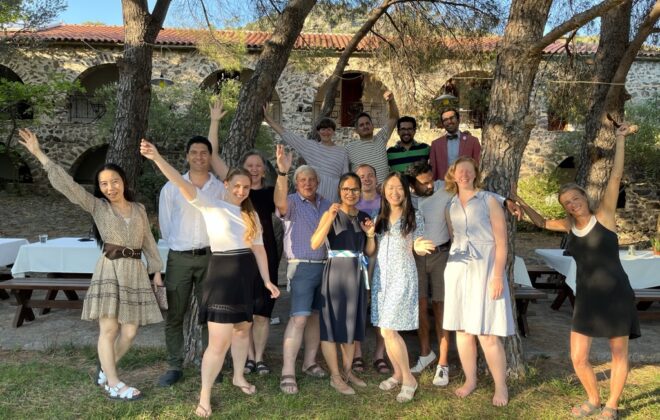Responsibility without care?
The discussion continues. Researchers Tim Dassler and Erik Thorstensen hold on to their views on care in RRI.
Tim Dassler and Erik Thorstensens blog post, Responsibility as care: The normative foundation of RRI – News from AFINO (ntnu.no), engaged Giovanni De Grandis (AFINO’s centre coordinator) so much that he posted a full reply – Responsibility as care: a response and an alternative foundation – News from AFINO (ntnu.no).
Now De Grandis has received a full and elaborating reply on his post, from the original blog writers.
Follow the discussion here!
Reply to Giovanni De Grandis:
In his response to our short blog post our colleague Giovanni De Grandis suggests constructive mistrust and responsible ownership as a possible normative foundation for RRI.
A much appreciated and thought-provoking input that made us stop and think. We hope that we can stimulate more debate with our reply to De Grandis.
Maybe not surprisingly we agree with him, that these can be important ingredients in operationalizing RRI and practical principles that help us make RRI comprehensible and manageable.
Nevertheless, we think it is not enough for being the normative foundation for RRI. These two principles represent what De Grandis himself attacks: a paternalistic or maternalistic version of care. They also fail to provide reasons and motivation for why we should care for being responsible in the first place and, to our understanding, fail to understand researchers and RRI institutions as always already being in a web of both human and non-human relations.
In other words, even though constructive mistrust and responsible ownership may have important functional value, they seem to be of limited use for addressing the need to create structures that support and promote responsible research and innovation.
The most important question we wonder about, is De Grandis suggesting that we can have responsibility without care?
The limits of care
One of De Grandis critiques is that care, especially care ethics tends to be paternalistic/maternalistic.
This critique has been discussed extensively in the literature and hinges on the misunderstanding that care and justice are in conflict with each other.
Major scholars of care, such as Noddings and Pettersen, the care perspective is an inclusive perspective leaving room for including many ethical theories. They argue that justice is an important ingredient and guiding principle providing moral orientation within the care perspective. Nevertheless, they also uphold that justice originates from universally shared human experiences and feelings, and that it is best nurtured and developed through a caring practice. Petersen, among others, has attempted to counter this critique with the concept of mature care that is not paternalistic. Rather, it is about realizing that we always already are part of a web of human and non-human relations, and thus we need to learn and develop competences knowing when to take what action in order to create positive and flourishing relations. These actions are based on relations that build on mutually respecting each other. Sometimes these actions, especially when others cannot act for their own flourishing, might need to be of a kind that could be described as paternalistic. This includes what De Grandis proposes as the “two foundations of RRI”; responsibility as distrust, and responsibility as ownership.
We argue that reducing RRI to these two dimensions is simply not enough and falls victim to De Grandis own critique of RRI being paternalistic. Which cannot be considered more than a one-sided understanding of care, or RRI.
An important challenge is that reducing responsibility to distrust, although constructive, and ownership does not provide any grounds for why we should feel responsible. Rather, it reduces RRI to the functional requirement of imposing duties on ourselves and others because one thinks one knows what is right and one knows best.
But in order to feel responsible for our research we first need to care about it and its life beyond our paternalistic grasp.

Consider the following thought experiment.
If your research was your child. Do you feel responsible for your child and care for it because those who give you money require it? Is not that confusing means and ends? Or do you take responsibility and care because you want your child to develop, flourish and become a responsible human being and the best version of her- or himself? Possibly even a better version of you? Is reducing your parenting strategy to constructive mistrust and ownership the best strategy to achieve this?
And if you have already pre-decided on the parenting strategy, are you not disregarding the needs of your child in different stages of development and your wish for her or him to become a flourishing human being?
To explain, an infant might not need your distrust in order to develop, while an adolescent’s action may sometimes benefit from a healthy portion of parental constructive distrust. And here we have no argument with De Grandis.
Still, you distrust because you care, you care for the development of your child and for his or her actions. Furthermore, executing responsibility as ownership might not be what an adolescent that is in the stage of becoming her or his own person and getting out into the world needs. Employing this parenting strategy will most likely lead to rebellion, not responsibility. Again, we agree with De Grandis that constructive distrust especially toward ourselves and our own ways of doing things can be a healthy ingredient in this case.
But it does not provide any grounds for why you should care in the first place.
Although our research is obviously very much different from our children, we argue that the same holds true for RRI. The first thing we must realize is that researchers usually care for their research, but that the socio-cultural relations and the societal, professional, and institutional system they are a part of makes it difficult, and in some cases impossible to be responsible. Competition, funding, societal needs, etc. all play a major role in creating limiting and empowering structures for when, how and for what we are able to care.
If we can agree on this, then the next thing to realize would be that if we want researchers to learn to care more for their research (or parents to care more for their kids) and be responsible we need to create structures that support and make this caring activity possible. In other words, we need to focus on how we can support practices and create structures that support research as a caring and responsible activity.
Care and the conditions for constructive disagreement
We can still disagree about the characteristics or thick definitions of the precise end-goal, that is, what a flourishing human being, the common good or responsible research is.
But, as mentioned above, care is not only about the content of what we think is good, it is more about how we can create support structures that make caring and taking responsibility possible. This includes not only imposing a duty but laying the grounds for an emotional and motivational involvement in what we do.
Disagreement on what we think is the content of the common good, the good life, etc. becomes thus not grounds for conflict, rather it becomes a possibility to reflect on each other’s position, a way to get into the conversation and a task of accepting different versions of what we think is good.
To care for what we share, simply means realizing that even though we might have different conceptions of the good and of how RRI should look like, if allowed, encouraged, and supported, all researchers who are committed to their research also care for it, and what becomes of it.
Research, politics, or parenting do not happen in a vacuum. They happen within societal structures and relations that we always already are a part of. Care is about how we can create positive relations with that which we are a part of, be it other people, our work as researchers or non-human relationships to the natural world.
Aristotle pointed out that in order to become competent, we need to repeatedly do what we do. And in order to do that, we need to learn to love what we do. Only then will it become second nature for us. To Aristotle, this emotional involvement is key to motivation and to being competent in what we do. And what is love, if not a certain type of caring relationship?
Will researchers learn to love RRI if it is reduced to mistrust and ownership?
How to learn to care for being responsible
De Grandis is right in pointing out that constructive mistrust regarding our own “good” intentions and the feeling that something really belongs to one and one has to take responsibility for it (ownership) are important ingredients in RRI. They are simply not enough, because they lack a foundation and positive vision and emotional motivation of why we should care for being responsible researchers and innovators in the first place.
The power of the care perspective is that it provides this emotional component that goes beyond rationalistic duty or pure function. It makes us realize that it is not enough to have good intentions, as De Grandis rightly points out, but rather than building on mistrust it provides us with a positive foundation for why we need to be responsible.
It is because our research, just as much as our children, do not exist in a vacuum but always in an interconnected web or human and non-human relations. Our actions and research affect these relations and sometimes small changes at one place in this web might create ripple effects with huge consequences.
To care for these relations and how we affect them is to be responsible, as researchers, as parents and as human beings.
We think that there can be no responsibility without care!
We invite De Grandis to reflect together with us on the following question: How do we get researchers do build a caring relationship and thus responsibility toward their own research?
Others are also of course welcome to join the discussion!
Advantages of looking at RRI from a care perspective
Looking at RRI from a care perspective, where AIRR articulate different dimensions of care, has the advantage of showing that RRI as care:
● is a perspective that is grounded in universal human needs, experiences, and emotions, but which also makes ethics and the question of responsibility concrete and accessible to non-experts in that it includes context, relationships, as well as the need to develop competence,
● focuses attention on relations and captures how human-technology, human-human, human-nature relations can be changed using technological and social innovations,
● shows the disruptive potential of novel technologies to these relations,
● contains an extended non-harm principle that requires us to actively intervene to prevent harm from occurring, while at the same time emphasizing positive relationships that promote human development without harming nature,
● illuminates power inequalities in human-human and human-nonhuman relations and places (as well as justifies) responsibility for safeguarding nature, ecological systems, biodiversity, etc. on us,
therefore, grounds our understanding in the that when we harm human-human and human-nature relations, we also harm ourselves,
● thus, gives us a rationale for why stewardship, ecological, social, and economic sustainability and societal utility are important principles for RRI,
● provides a foundation and applicable framework for capturing, and linking different dimensions of RRI, ethical traditions, societal values, as well as how different stakeholders think and feel about the effects of technological innovation,
● and finally, it provides a positive political vision that can be an orientation in thinking and acting for how to responsibly research, develop and use technological innovations.
Featured image: Colourbox.

Tim Dassler
Tim Dassler is researcher at GenØk – Centre for biosafety in Tromsø, Norway. He works on the assessment of ethical, cultural and social aspects of biotechnology and how to make research and innovation in these fields more responsible and sustainable. Read more about Tim on our webpage.

Erik Thorstensen
Erik Thorstensen leads the working group Building blocks for enhanced societal responsibility (WP4) in AFINO. Read more about Erik on AFINO's webpage.




